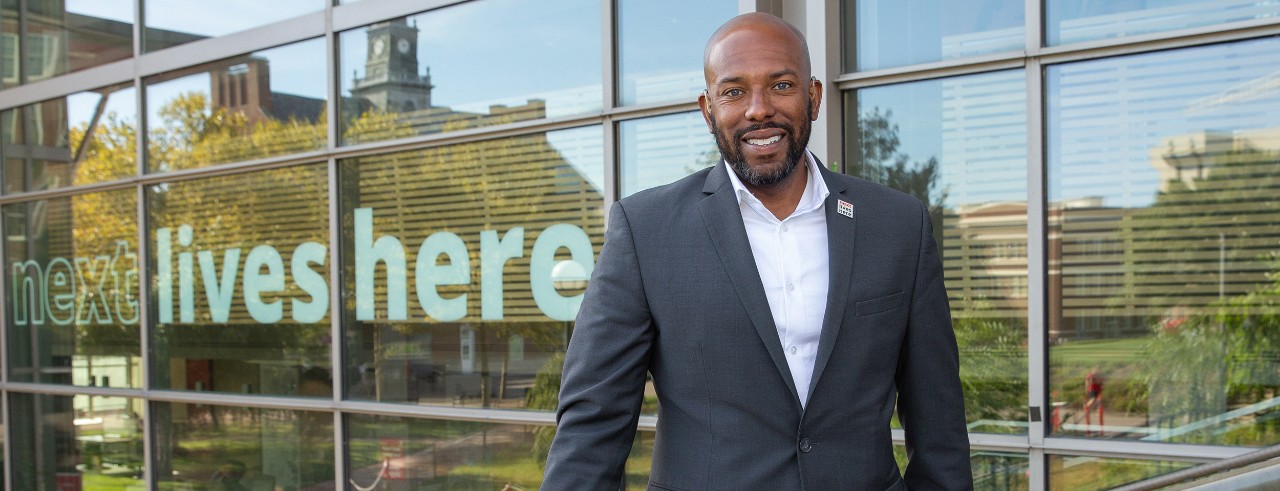
Meet Christopher Johnson, UC’s first Black, deaf academic administrator
Johnson’s solution-based leadership comes from the experience of being disadvantaged
Christopher Johnson became the first Black, deaf assistant dean at the University of Cincinnati in May 2024 — a first for the institution and a rarity in academia.
“People need to see that UC is employing deaf and neurodivergent leaders in prominent positions,” says Johnson, assistant dean of inclusive excellence at UC’s College of Cooperative Education and Professional Studies (CCPS).
Johnson is spearheading an inclusive excellence strategic plan for CCPS, one of the largest co-op employer programs in the world. The university is widely known as the inventor in 1906 of co-op employer programs and more recently reported that in the 2023-24 academic year, more than 8,300 students earned an estimated $88.8 million collectively through paid co-op experiences — up 18% from the last reported data.
If you don’t have the answer, you find the answer by overcoming fear.
Christopher Johnson Assistant dean, UC's CCPS

Christopher Johnson, assistant dean of CCPS. Photo/Andrew Higley/UC Marketing + Brand
To build on UC’s outstanding record, Johnson says he will focus on bringing disability awareness into the classroom and disability justice into the co-op program, enabling students to become problem solvers in a world that often centers around the able-bodied.
His philosophy: “If you don’t have the answer, you find the answer by overcoming fear and including marginalized identities at the table, not on the side.”
According to national data, 2% of the population is deaf or hard of hearing, and among people aged 25 to 64, an estimated .4% of Black deaf people have completed a doctoral degree, medical degree, or juror doctor degree combined. The number is gradually improving but remains low, especially when considering the 53% national employment rate among the Deaf population.
Johnson, who was born deaf in rural Georgia, had much to overcome, as shared in an interview with UC News.
What was your early life like?
Christopher Johnson: Being culturally and linguistically deprived growing up in the South was a life-changing experience for me and my family. Being the first deaf person in my family to receive multiple degrees has pushed me to go above and beyond to raise the standard of academic excellence and sense of belonging, not only for deaf and hard-of-hearing students but also for [American Sign Language] students who passionately bridge gaps between mainstream and deaf communities.
How did you find your way to higher education?
Johnson: I was born deaf with no adequate resources or access to ASL or a community — what we usually call a “third space” — to properly equip me to become a leader in higher education. I grew up in a loving and supportive household where my parents raised the bar by constantly motivating me to read five or more books each summer. The resilience and persistent advocacy for my rights and access to education were the stepping stones that paved the way for my opportunity to break the cycle of Black deaf individuals being entrapped in the school-to-prison pipeline. To be Black and deaf in higher education is not interchangeable; it is addressing two separate experiences simultaneously.
What attracted you to the University of Cincinnati?
Johnson: What drew me to the role of assistant dean of inclusive excellence was the realization of how transformative cooperative education can be, through a deaf lens. Initially, I didn’t fully grasp its significance, but through research and applicable experience, I’ve come to appreciate co-op's profound impact on students' experiential learning, academic excellence and the promotion of intellectual diversity in the classroom. This effort allows us to generate the problem solvers of tomorrow.
What message do you have for the university-wide population?
Johnson: Disability justice and inclusive excellence frameworks are essential to dismantling exclusionary practices in each of our decision-making processes. As Jesse Jackson said, “The problem is that the hearing world does not listen.” My hope is that this article inspires able-bodied individuals to break the barriers that have silenced the deaf community for centuries and to ensure that their voices are heard and valued in decision making, creating an inclusive and equitable university environment for all.
Read more about ASL at UC in A Sixth Sense.
Featured image at top of Christopher Johnson by Andrew Higley/UC Marketing + Brand.
Impact Lives Here
The University of Cincinnati is leading public urban universities into a new era of innovation and impact. Our faculty, staff and students are saving lives, changing outcomes and bending the future in our city's direction. Next Lives Here.
Related Stories
Meet Christopher Johnson, UC’s first Black, deaf academic administrator
September 23, 2024
Christopher Johnson is the new assistant dean of inclusive excellence in UC’s College of Cooperative Education and Professional Studies (CCPS). In a UC profile, Johnson explains what it is like to be both deaf and and Black in academia.
UC growth continues as Big 12 newbie admits largest class
September 15, 2023
It's now official. The University of Cincinnati enrolled 50,921 students for the fall semester. Growth has been continuous with the student body increasing by 19% during the past decade.
Chronicle of Higher Education: More international students finding success in U.S., Cincinnati
October 17, 2023
UC's Jon Weller speaks with the Chronicle of Higher Education for a story about growth in new student visas. India has overtaken China as the largest source of international students in the United States. At UC, India also continues the largest share of international students on campus.
